Iran to import 50,000 tons of potatoes to combat price hikes
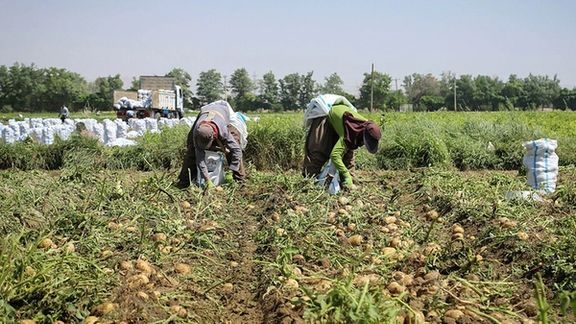
To stabilize soaring potato prices, Iran is importing 50,000 tons of the staple vegetable, according to Iran’s deputy agricultural minister.

To stabilize soaring potato prices, Iran is importing 50,000 tons of the staple vegetable, according to Iran’s deputy agricultural minister.
The imported potatoes will be sold at a target price of about 30 US cents per kilogram, less than half of the current market prices, Akbar Fat’hi said on Wednesday.
The average income of an Iranian wage earner is about $150.
He anticipates the influx of imported and domestically stored potatoes will lead to price reductions in the coming days.
Fathi attributed the current high prices to increased exports and the off-season for domestic potato production. He also noted that further potato imports may be necessary if the market does not stabilize as expected.
The move follows recent reports of significant price increases on essential food items, with some activists saying the real inflation rate for basic necessities is far higher than official figures suggest.
Labor activist Faramarz Tofighi, speaking to ILNA, highlighted the rising cost of vegetables, including potatoes, making it difficult for workers to afford basic necessities.
He argued that the real inflation rate for essential goods is likely above 50-60%, significantly higher than official figures announced to be about 40%.
He added that many families will soon be unable to afford even red meat monthly. He also cited rising prices for bread, meat, dairy, and an 80% increase in egg prices over the past two months.
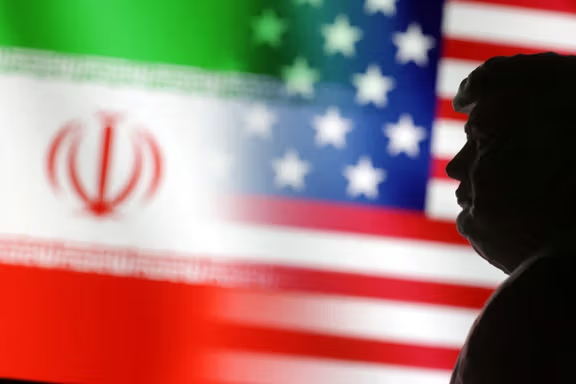
Iran's political establishment continues to send mixed signals on its openness to talks with Washington, as the deputy speaker of parliament said Wednesday that Tehran supports negotiations, while a leading hardline newspaper doubled-down on its opposition.
Hamidreza Hajibabaei, the senior lawmaker and former minister in Mahmoud Ahmadinejad’s administration, told the media that Tehran has no “enmity or war with America.”
“We are open to negotiations, but they must be fair,” he added.
Iranian officials repeatedly stress the need for fair negotiations, indicating that any demands must fall within the scope of what they are willing to accept.
During talks between the two sides a decade ago, Tehran strongly rejected the inclusion of non-nuclear issues, including its ballistic missile program and regional activities.
Prior to Hajibabaei's remarks, Supreme Leader Ali Khamenei, who holds the highest authority in the Islamic Republic, cautioned top government officials to remain vigilant during any negotiations.
Several state-controlled media outlets and commentators interpreted this as a subtle signal of Khamenei’s approval for talks with the Trump administration.
In contrast, the ultra-hardliner Kayhan newspaper, with close ties to Khamenei’s office, sharply criticized the US for pressing maximalist demands on the Islamic Republic. According to Kayhan, these demands included imposing limits on its missile program, reducing its nuclear activities to what it described as a symbolic level, and prohibiting its interventions in the region.
Despite a rising number of Iranian officials and commentators, who are permitted to speak to the media, advocating for negotiations, Kayhan maintained that Tehran does not see an urgent need to negotiate the lifting of sanctions.
The country’s economic crisis, which has been ongoing for some time, has deepened in recent months, with the national currency losing more than half of its value and Iran facing severe shortages.
"The discussion of negotiations with the US, which will certainly lead nowhere, causes powerful governments that have formed the opposing front against the US to doubt Iran's seriousness in economic and multilateral cooperation," Kayhan's analysis concluded, potentially hinting at a partnership deal Tehran recently formalized with Moscow. "As a result, they may refrain from entering major partnerships with the Islamic Republic. Therefore, negotiating with the US is a lose-lose game for us and a win-win for the US."
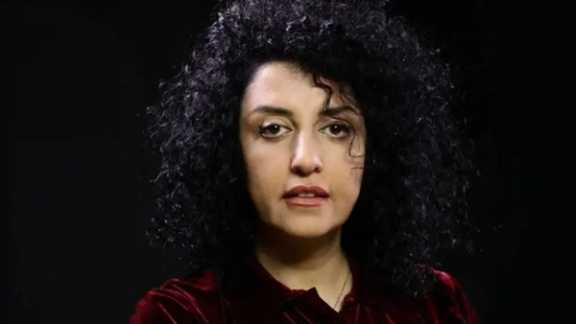
Narges Mohammadi, the Nobel Peace Prize laureate and prominent human rights activist, has described the No to Execution Tuesdays campaign by female prisoners as a "civil movement capable of expanding across Iran".
Speaking during a virtual event on Clubhouse to mark the campaign's first anniversary, Mohammadi highlighted its significance in opposing the widespread use of executions in Iran.
"The Islamic Republic seeks to assert its hollow authority by creating fear through mass executions," said Mohammadi, one of the most outspoken activists inside Iran.
"This campaign is not just a protest but a deeply human rights-driven effort that holds the potential to unite and mobilize people against the death penalty."
The campaign began on January 30, 2024, when political prisoners in the women’s ward of Tehran’s Evin Prison launched hunger strikes every Tuesday to protest increasing executions and show solidarity with inmates at Ghezel Hesar Prison in Karaj who had done the same.
Now in its 53rd week, the movement has gained momentum, drawing support from political prisoners across Iran.
Mohammadi, currently on medical leave from imprisonment, expressed her hope for an Iran free of executions.
"The gallows ropes will be torn apart by the powerful hands of each one of us," she said.
"One day, these execution chambers will serve only as a historical lesson on the consequences of tyranny, guiding humanity toward progress, freedom and equality."
The campaign’s message has reached international audiences, amplified by the participation of Iranian political prisoners from diverse backgrounds.
Mohammadi called for continued unity among democracy and human rights advocates, underscoring the campaign’s potential to foster lasting change.
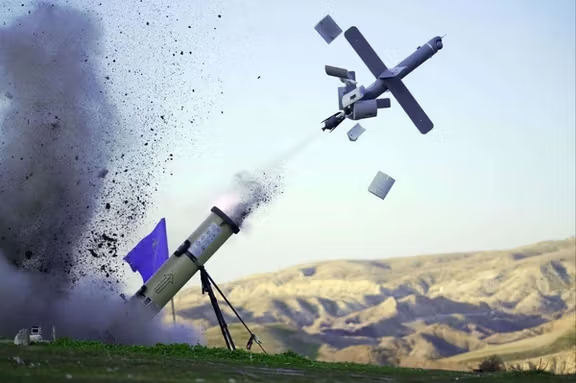
Iran's Islamic Revolutionary Guard Corps (IRGC) launched a new loitering unmanned aerial vehicle called Rezvan during drills held by its ground forces, according to state-run media.
The new drone which was unveiled in early January has a range of 20 kilometers (12.4 miles) and an operating time of 20 minutes.
"Rezvan is similar to the Russian-made Lancet and Israeli-made Hero drones," a Telegram channel affiliated with the IRGC reported Tuesday.
The drone has been designed for rapid deployment and targeted attacks, particularly in complex terrain, according to the IRGC.
The suicide drone is fired from a cylindrical launcher and transmits live video to the operator, allowing for precise target selection and engagement, IRGC media Tasnim reported.
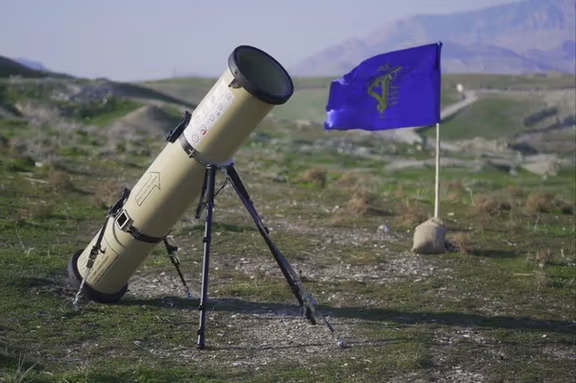
Iran has been conducting multiple military exercises in the past few weeks, including air defense drills near nuclear sites like Natanz and a 110,000-strong Basij mobilization in Tehran, to showcase its capabilities and project a message of strength in the region, following consecutive defeats for its allies since September.
IRGC commander-in-chief Hossein Salami said earlier this month that the ongoing military exercises aim to make the enemies refine their assessments of Iran’s defense capabilities and demonstrate that the country’s deterrence is unaffected by external events, a tacit reference to the fall of Tehran’s longtime ally Bashar al-Assad in Syria.
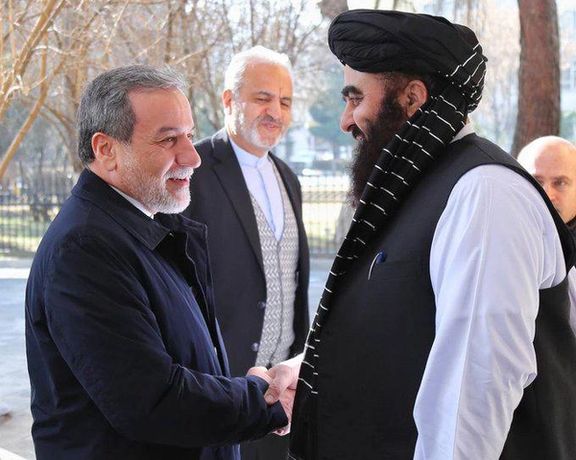
Iranian media and political commentators have criticized Foreign Minister Abbas Araghchi’s official visit to Kabul on Sunday, arguing that Tehran has not yet formally recognized the Taliban government.
In a Monday article, reformist publication Etemad Online questioned the rationale behind the visit, arguing that while neighboring countries are a priority in foreign policy, visiting a nation whose government Tehran has not recognized raises significant concerns. The article noted that the trip took place “despite warnings from experts.”
The caretaker of Iran's embassy in Kabul, Alireza Bigdeli, declined to confirm whether Araghchi’s visit signified recognition of the Taliban regime. “Recognition [of a government’s legitimacy] is a process grounded in international law with its own specific criteria,” he said, asserting the distinction between diplomatic engagement and formal recognition.
On Saturday, the conservative newspaper Jomhouri Eslami had urged Araghchi to cancel the trip, citing unresolved issues such as disputes over water rights between Tehran and Kabul, border violations by the Taliban, the influx of illegal immigrants into Iran, and Taliban support for terrorist groups.
The newspaper warned that attempting to address these issues during the visit was “only an illusion” and predicted the visit would yield no tangible benefits.
In a harshly worded commentary published Monday, Jomhouri Eslami criticized the visit, calling the Taliban an “insurgent, violent, and backward group.” The article also questioned whether the Taliban merited attention from the Iranian Foreign Minister and accused proponents of the visit of either misunderstanding the region or prioritizing personal agendas over Iran’s national interests.
Ali Bigdeli, a senior foreign policy expert, also expressed skepticism in an interview with the Fararu news website. He argued that Araghchi didn't have to travel to Kabul to address Iran’s water rights regarding the Helmand River or recent tensions with Afghanistan. Bigdeli suggested that Iran could have invited a high-ranking Afghan delegation to Tehran instead.
Notably, the leader of the Taliban, Mullah Hibatullah Akhundzada, did not meet with the Iranian foreign minister during his one-day visit.
Araghchi stated that Afghan officials had pledged to honor their obligations regarding Iran’s share of the Helmand River water, framing it as both “human and religious duties.”
While some media outlets were critical, others offered a more positive assessment of the visit.
Khabar Online, a platform affiliated with former Parliament Speaker Ali Larijani, highlighted potential economic and political benefits. The outlet also discussed the opportunity to resolve longstanding water disputes, which, if left unaddressed, could trigger mass migration from Iran’s southeastern province of Sistan and Baluchestan.
“Experts in international relations believe that the Ministry of Foreign Affairs, recognizing Afghanistan’s geopolitical significance, is prioritizing trade and security to align Afghan authorities’ political behavior with Iran’s national interests,” the outlet's report noted.
During his visit, Araghchi expressed Tehran's eagerness to boost imports from Afghanistan in order to establish a more balanced trade relationship. Currently, Afghanistan imports oil, gas, food products, construction materials, agricultural machinery, and petrochemical goods from Iran.
According to Afghanistan’s Ministry of Industries and Trade, bilateral trade grew by 84% in 2024, reaching $3.197 billion.
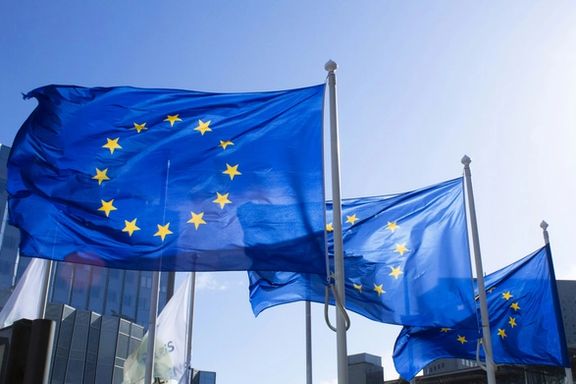
The European Union’s High Representative for Foreign Affairs said Iran poses an ongoing threat to international peace as the bloc called for a halt to executions and urged Tehran to align with international human rights standards.
Kaja Kallas said the council in its meeting on Monday "discussed Iran’s continuing threats to international peace". European member states, she added, emphasized that Tehran's "practice of detaining foreign nationals for political leverage must end."
"We also will have a deeper discussion on Iran and European Union-Iran policy, in the very near future," she added.
The Council of the European Union in a meeting on Monday called on Iran to halt executions and align its policies with international human rights standards, emphasizing the rights of women, girls, and minority groups.
“The EU will also urge Iran to release all arbitrarily detained individuals, including foreign and dual nationals, to bring detention conditions into line with international standards and to provide due process to all detainees,” the Council said in a statement.
The Council also demanded Tehran's full cooperation with UN mechanisms, including the Independent Fact-Finding Mission and the UN Special Rapporteur on Iran.
Earlier on Monday, French Foreign Minister Jean-Noel Barrot said that his country would propose the European Union issue sanctions against Iranian officials responsible for the detention of French citizens in Iran.
At least three French nationals, Olivier Grondeau, Cecile Kohler, and Jacques Paris, were detained in 2022 and remain in custody in Iran.
Last week, the European Parliament adopted a motion for a resolution condemning Iran’s detention of European Union citizens, labelling the practice as “hostage diplomacy.”
The resolution called for the immediate and safe release of all EU citizens held in the country, including the three French nationals—Grondeau, Kohler, and Paris—as well as Swedish-Iranian death-row prisoner Ahmadreza Djalali.